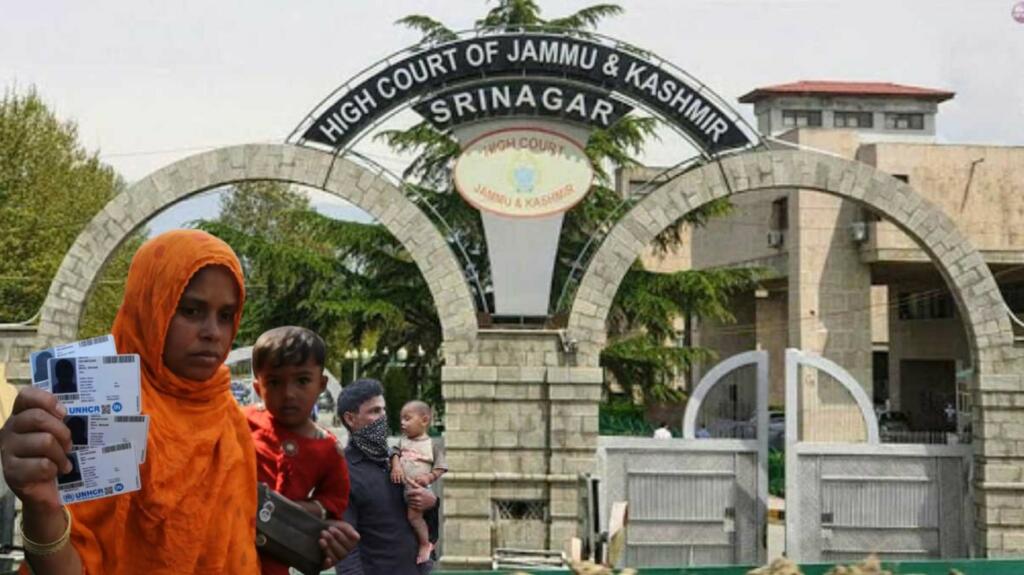The Jammu and Kashmir and Ladakh High Court on Tuesday putting its foot down directed the Secretary Home, Union Territory of Jammu and Kashmir to identify the Rohingya and Bangladesh illegal immigrants staying illegally in the UT and prepare a comprehensive list in the coming six weeks.
It said in the statement, “We direct the secretary home, UT of Jammu and Kashmir to consider the matter and to evolve a mechanism for the identification of all illegal immigrants and to prepare a list after identifying them.
The court also observed that in one of the orders dated 24.05.2017 passed in the PIL indicated that at that time the government had constituted a Group of Ministers (GoM) to examine various issues relating to illegal migrants from Myanmar and Bangladesh in Jammu and Kashmir.
“The group of ministers was supposed to take up the matter, examine it and furnish a report thereof. But till date, nothing has come on record. In the meantime, the state of Jammu and Kashmir was bifurcated and the UT of J&K has been created,”
Do not shift these aliens to refugee camps — PIL petitioner
The bench comprising of Chief Justice Pankaj Mithal and Justice Moksha Khajuria Kazmi was hearing the PIL filed by Advocate Hunar Gupta. The PIL further sought directions to the Jammu and Kashmir to shift all the illegal immigrants from Myanmar and Bangladesh from the UT of J&K to any other place as no refugee camp has ever been declared either by J&K or by United Nations in J&K.
The petitioner said, “Due to illegal immigrants from Bangladesh and Myanmar, there will be an increase in pro-separatists as well as anti-Indian activities in Jammu and Kashmir, especially in the communally sensitive Jammu region, which has so far displayed maturity and tolerance. Immediate and necessary directions are required to the respondents for the shifting of these immigrants to their native places,”
It is pertinent to note that according to official government figures, there are 13,400 Myanmar and Bangladeshi illegal immigrants living in various areas of Jammu and Kashmir. However, according to the petitioner, the numbers could be much higher and that’s why the court’s decision to compile a list becomes ever more important. The next hearing in the case has been scheduled for July 15, 2022.
How previous governments wanted to alter J&Ks demography
The demographic takeover of Jammu had been the aim of the successive Jammu and Kashmir governments (which is usually headed by a Muslim from the Kashmir region) for a long time as they tried to do it through various legislative and executive decisions.
Be it the Roshni act or the liberal settlement of Rohingyas in the Jammu region, these decisions had only one aim – to make the region a Muslim majority area just like Kashmir. The valley became Muslim dominated after the exodus of Kashmiri Pandits in the early 1990s.
Aimed at ‘conferring 20.55 kanals of state land to the occupants,’ the Roshni Act was implemented in 2001 by Ghulam Nabi Azad, the then CM of the state. The Act, as per the then government’s claims, was aimed at generating resources for power projects and conferring proprietary rights to occupants of state land subject to payment of land costs fixed by the government.
However, as later investigated and accused by lawyer Ankur Dharma, advocate and chairman of Ikjutt Jammu, the Roshni Act was actually an attempt to change the demographics of the entire region of Jammu.
According to Zee News, 25,000 people were settled in Jammu under the provisions of this legislation, while only 5,000 were settled in the Kashmir region of the erstwhile state. Out of the 25,000 illegal occupants who benefitted from the Roshni Act in the Jammu region, about 90 per cent were Muslims. This was therefore clearly a state-sponsored attempt at Islamising and radicalising the Jammu region of the Union Territory.
Read More: ‘Roshni’ Act repealed by Jammu and Kashmir government
Aliens are a threat to India’s peace
Rohingyas are a burden in India and the country is already facing a crunch of resources to meet the demands of its one billion-plus population. Their radicalisation will pose further threats to the indigenous population, whichever states they are made to settle in – whether it is Kerala or the Union Territory of Jammu. This is why Rohingyas must be deported to Myanmar as quickly as possible.
The Constitution makes it abundantly clear that India, as a sovereign nation, has the first and foremost Constitutional obligation and duty towards its citizens and to ensure that the demographic and social structure of the country is not changed to its detriment.
Deporting the Rohingyas back is the only way to stop the demographic takeover of Jammu. The Modi government in coordination with UT’s Home Secretary should work swiftly to furnish the list so that the court can take the requisite decision.
